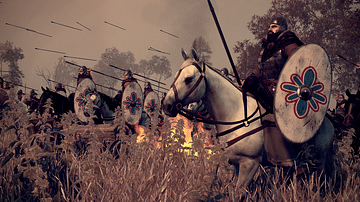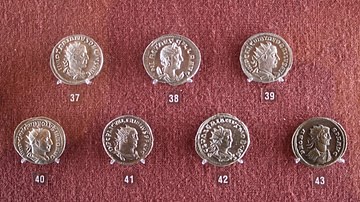Search
Search Results

Definition
Roman Senate
The Roman Senate functioned as an advisory body to Rome's magistrates and was composed of the city's most experienced public servants and society's elite. Its decisions carried great weight, even if these were not always converted into laws...

Collection
Ancient Roman Warfare
With a huge reserve of resources in men and equipment and a culture geared for warfare, the Romans were relentless in expanding their borders and putting their neighbours to the sword. The Roman army, with its well-trained, well-equipped...

Definition
Arminius
The Cherusci noble Arminius (c. 18 BCE - 19 CE) led the resistance to Roman conquest of Germania during the years 9-16 CE. Likely raised as a child hostage in Rome, Arminius gained command of a German auxiliary cohort in the Roman army. Posted...

Definition
Battle of Adrianople
The Battle of Adrianople on August 9, 378 CE ranks among the worst military defeats in all of Roman history. Its estimated losses of over 10,000 are comparable to Roman defeats at Cannae (216 BCE) and Carrhae (53 BCE). The battle pitted the...

Article
The Roman-Parthian War 58-63 CE
The Roman-Parthian War of 58-63 CE was sparked off when the Parthian Empire's ruler imposed his own brother as the new king of Armenia, considered by Rome to be a quasi-neutral buffer state between the two empires. When Parthia went a step...

Lesson Pack
Roman Innovations and Architecture
We have prepared two lesson plans including classroom activities, assignments, homework, and keys as well as: - Glossary of keywords and concepts in an excel format - Open questions adaptable for debates, presentations, and essays -...

Definition
Titus (Roman Emperor)
Titus was Roman emperor from 79 to 81 CE. On June 24, 79 CE Titus Flavius Vespasianus succeeded his father Vespasian (r. 69-79 CE) as emperor of the Roman Empire. Prior to his ascension to the throne, he was considered by many as “…unpopular...

Article
Roman Roads
The Romans built roads over ancient routes and created a huge number of new ones. Engineers were audacious in their plans to join one point to another in as direct a line as possible whatever the difficulties in geography and costs. Consequently...

Definition
Roman Coinage
Roman coins were first produced in the late 4th century BCE in Italy and continued to be minted for another eight centuries across the empire. Denominations and values more or less constantly changed but certain types such as the sestertii...

Article
Roman Daily Life
From the early days of the Roman Republic through the volatile reigns of such ignoble emperors as Caligula, Nero, and Commodus, the Roman Empire continued to expand, stretching its borders to encompass the entire Mediterranean Sea as well...